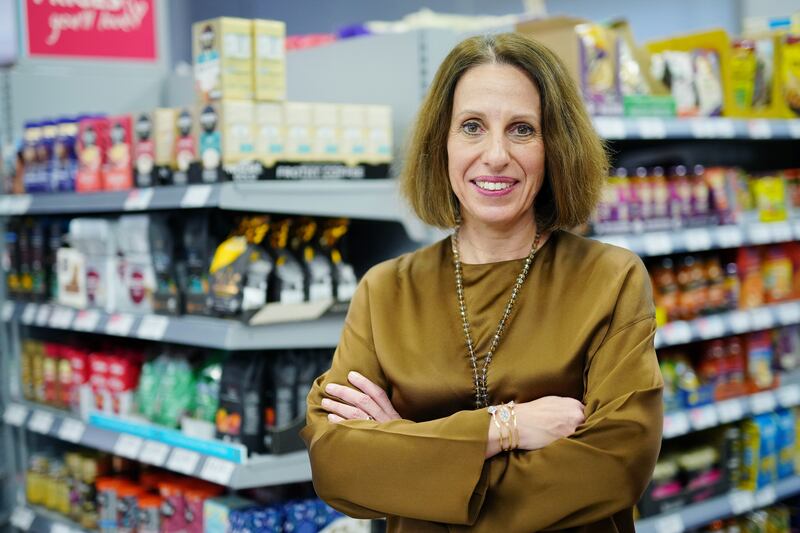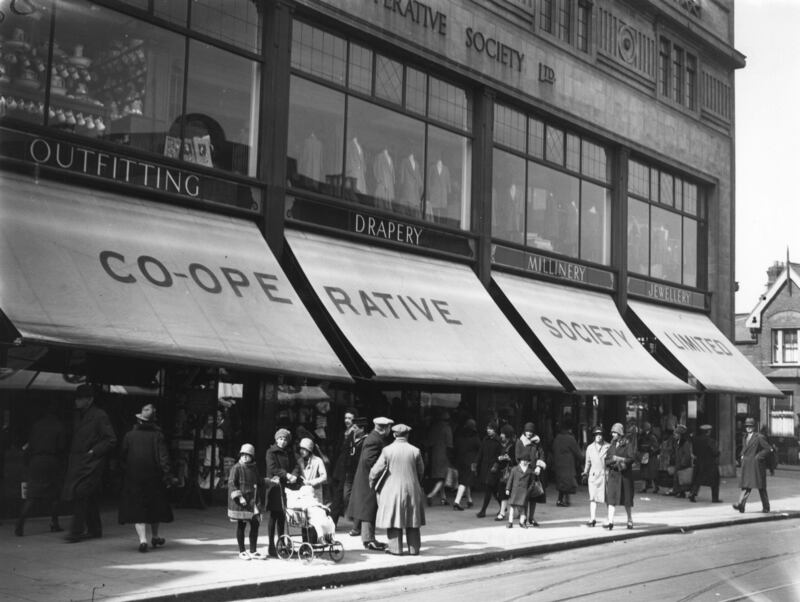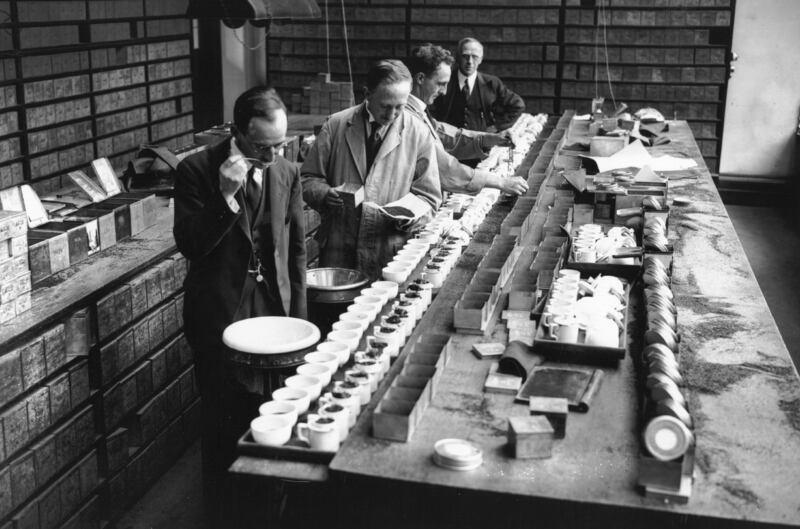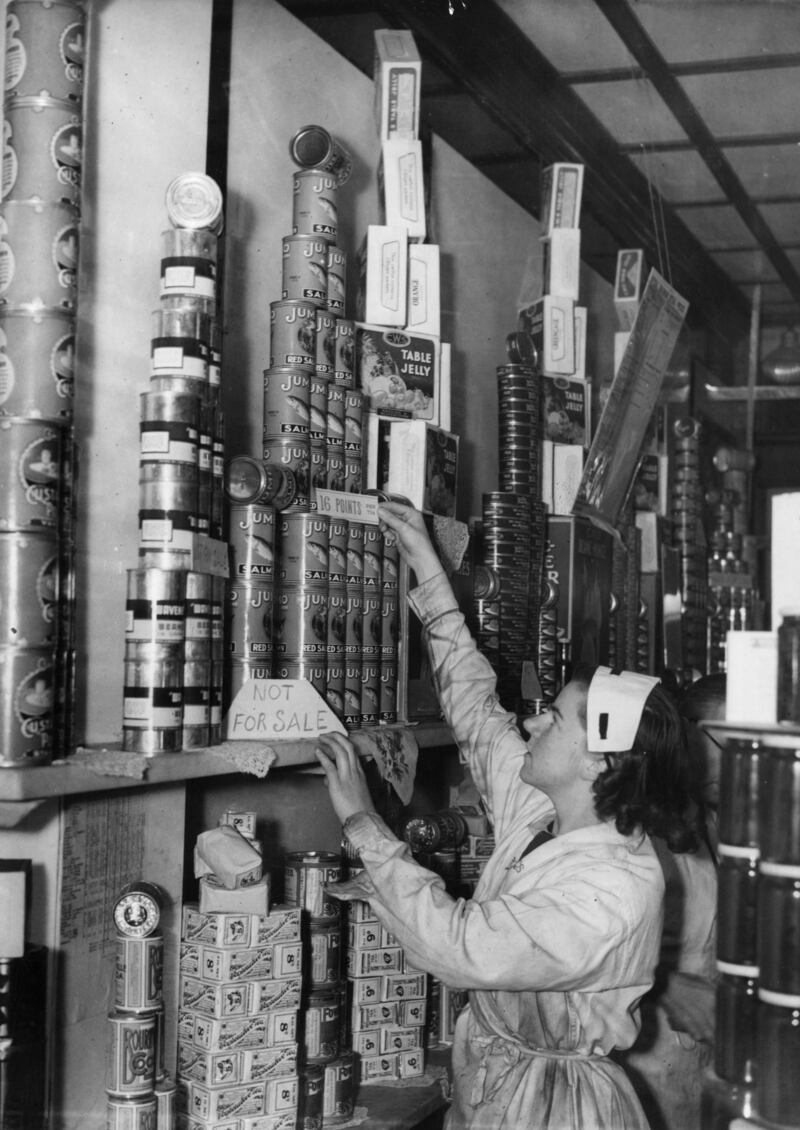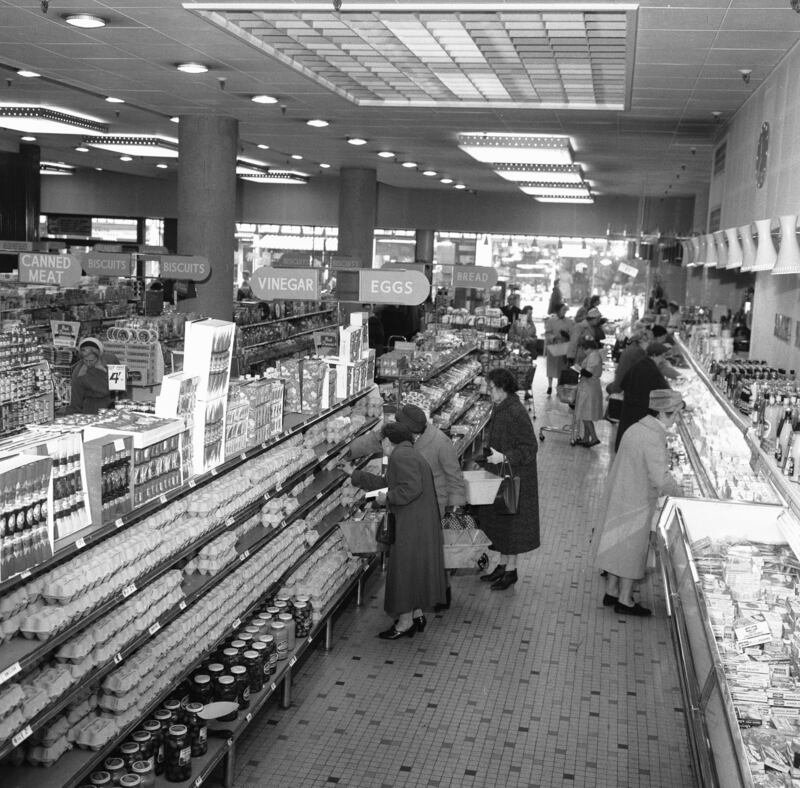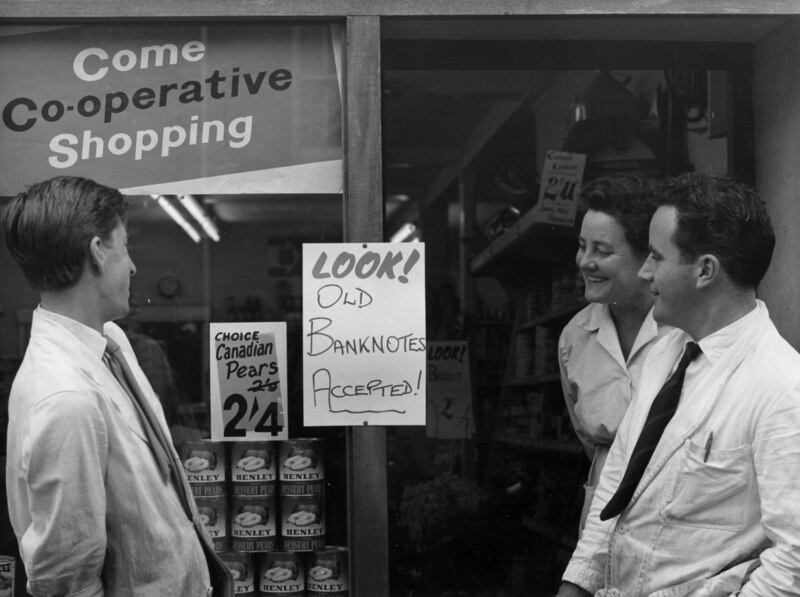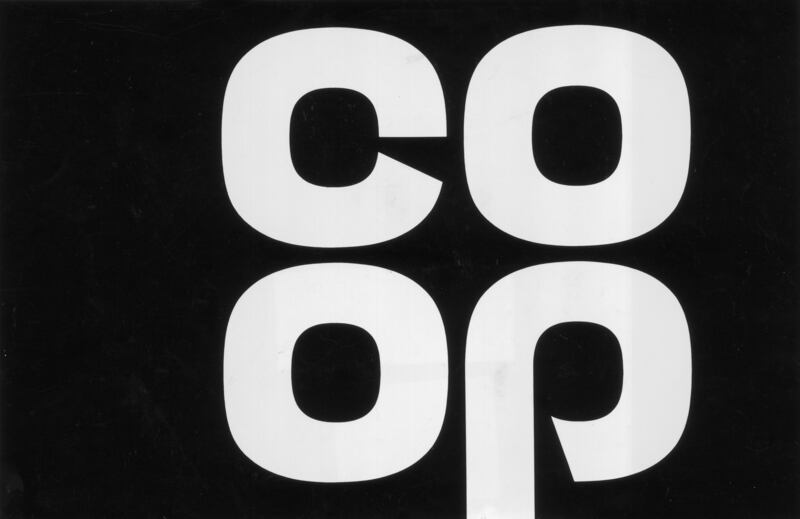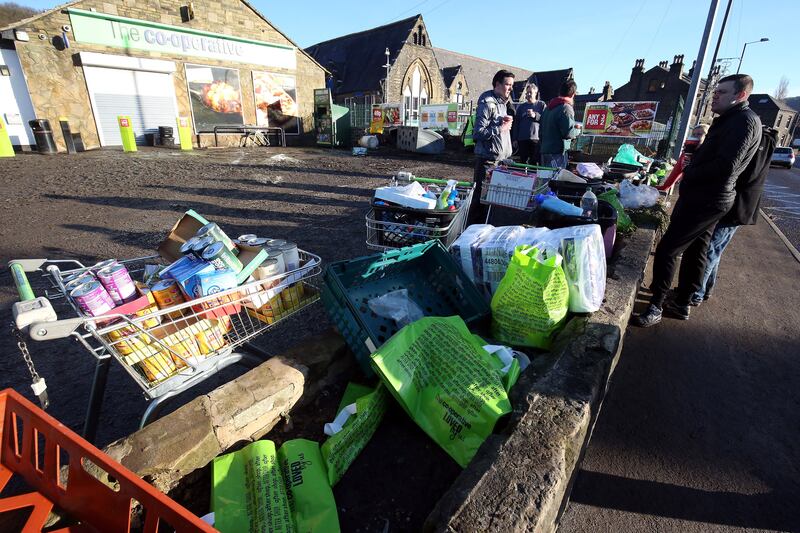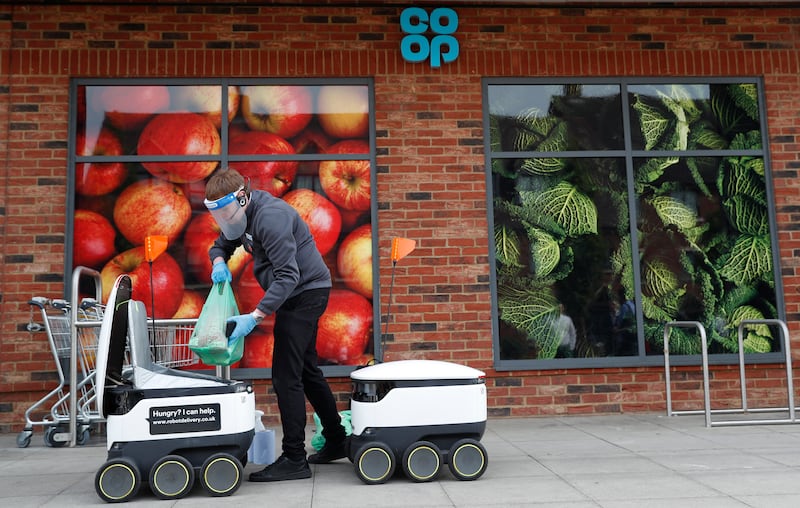Eyes transfixed on the till drawer full of notes and coins that had just sprung open, five-year-old Shirine Khoury decided there and then what she wanted to be when she grew up.
The career choice was made on the mistaken belief that the cash within, more than she had ever seen in her short life, was all owned by the supermarket checkout assistant taking payment for the family groceries.
“I remember saying, ‘I want to do that job',” the Beirut-born executive, now known as Khoury-Haq, tells The National. “‘Look at all the money she has’, and my mother said: ‘Well, that’s not her money. It belongs to Safeway.”
When Shirine then asked who the richest woman in the world was, the answer compelled the precocious youngster to turn her ambitious sights towards the throne of Britain instead.
More than four decades later, she did go inside Buckingham Palace, if not as its chief resident then as chief executive of The Co-op, to accept one of The Queen’s Awards for enterprise in sustainable development.
Something, therefore, of a happy medium between two impetuous childhood ambitions for an expert at setting professional objectives. She stresses it is the journey, not the endpoint that matters.
“It hasn’t really mattered to me that I haven’t reached a goal. Progress towards it – that is really the important part.”
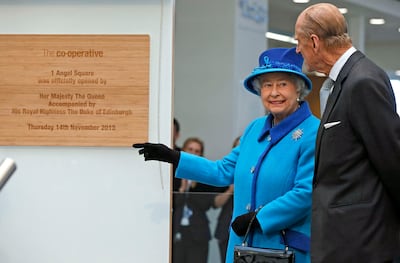
Still, it is to be hoped that Khoury-Haq, 52, occasionally indulges a small smile to herself as she passes the spot in the foyer of the group's headquarters in Manchester where Queen Elizabeth stood to open the building a decade ago.
Personally, the 300km move from a career in financial services in London to retail in the north-west of England in 2019 took something of a recalibration but she has been adjusting to new environments her whole life.
One such adjustment has been the fulfilment of being a mother to twin girls, born after a long fertility struggle but now a focus of Khoury-Haq's life that allows her a new way to connect to her own heritage, as well as show leadership in achieving a work-life balance to the tens of thousands in The Co-op family.
“We've taken the girls to Dubai and to Abu Dhabi twice where one of my cousins lived,” she says. “It's nice to get them on the beach in the water, and to be able to do it in a location where the people are lovely, where it's safe and to be able to show them some of my culture as well.
“For them to be able to see their family, to see the Arab and Turkish side – that's really important to me as well.”
It is rounding the circle for Khoury-Haq who may have been born in Beirut but by the age of 12, had lived on every continent except Antarctica. The uprootings came thick and fast as her father traversed the world as an oil engineer and often fell in the middle of an academic term.
Shortly after her arrival as chief financial officer of The Co-op, with its 2,600 convenience stores, 800 funeral homes, insurance arm and legal services division, the family and professional intersected in away that came to resonate far and wide.
The Co-op challenge she took on was to build on a decent recovery from enormous debts amassed after the 2008 financial crisis. But there was some unexpected hardship in store, as well.
“Just as I was thinking, ‘Goodness, well, the curtains are up and I kind of know what I’m doing here’, Covid hit,” she recalls. “We’re in the grocery business, we’re in the funeral business and you can imagine the sort of turmoil.”
Only months after the Co-op’s Funeralcare sought to highlight some of the human stories behind the shocking mortality figures of the Covid-19 pandemic, Khoury-Haq lost her own father to the virus.
Announcing his death on Twitter, she wrote: “He was an engineer, a mathematician, a comedian, a musician, the master of the belly laugh. Above all, he was my Daddy.”
She was born in Beirut to a Turkish mother and a Palestinian father, from whom she inherited a head for numbers and a strong inclination to fix things.
“I learnt from the best,” Khoury-Haq says, although admits she sometimes goes above and beyond by tinkering when others might consider matters to be already relatively in hand.
In addition to the five languages she speaks, her peripatetic childhood in Lebanon, England, Turkey, Algeria, the US, Australia and Brazil imbued a sense of self-reliance that she drew on when appointed as the first female chief executive in the 160-year history of The Co-op.
Not only were there a mere handful of women running FTSE100 or equivalent UK businesses, a fifth of the companies had all-white boards at a time when the energy market was tightening further, Vladimir Putin had invaded Ukraine, inflation was rising and the cost of living crisis loomed.
However, Khoury-Haq describes herself as a survivor well equipped from having faced many similar obstacles in the past.
“If everything around you is moving and changing, one has to be centred in oneself,” she says. “Which is why I chose from an early age to invest in myself, saved my money, set my goals so as not to have to count on the environment to provide. I decided I was going to be my own anchor.”
While The Co-op has clear financial and operational objectives, the group prides itself on a set of principles to create a fairer and better way of doing business, while giving back to the communities in which the stores are based.
It is hard to think of an employer with whom Khoury-Haq’s own deeply held beliefs would align more neatly, and there is no doubt that she considers the role to be more than just a job.
“My values are always on the table,” she says, “I don’t want to have a conversation that doesn’t include them, especially when talking about how we treat people and how we behave in the organisation.”
Many of her own, often painful, life experiences are reflected in the pioneering social policies for staff, not least those on equality and inclusion.
She talks about a terrifying physical assault on her father and having slurs shouted in her face growing up in Australia; how responses to job applications fell from 90 per cent to zero after dropping the surname of her first husband in favour of her Arab maiden name hyphenated with that of her Pakistani-British second husband; and an upsetting encounter at an industry dinner when someone disparaged her heritage.
Khoury-Haq knows that Co-op staff across the country face such bigotry on a daily basis.
“It kills me to see anyone who's marginalised or doesn't reach their full potential just because of their race, gender, sexuality or disability.
“It's so utterly wrong. If I can, in my position in the organisation or out in the world, do something to address that, then I have a duty to do it.”
Her empathy for those struggling to make ends meet led The Co-op to forgo last year’s multi-million-pound festive advertising campaign in favour of supporting the expansion of a subsidised supermarket chain that provides grocery items to the needy in return for a small entry fee.
The decision was mirrored at home where she introduced a one-gift rule for Christmas for her six-year-old daughters while donating to an initiative run by a mission for children whose parents could not afford presents.
“Honestly, I can’t believe that that’s been made into such a big deal,” she says of the resulting headlines. “One Christmas present should be enough. I think it’s really important to give the reality of life to children. So, I spoke to them about what other people were experiencing, and they were up for it.”
Khoury-Haq might earn more than £1 million a year now but she has done it tough in the past. After her father lost his job in the fallout of the oil crisis of the 1980s, she began part-time shifts at Pizza Hut and later at McDonald’s in what was to become a pattern of juggling work with academic studies.
During several consecutive summers, she put herself through a degree in accounting and economics at the Australian National University.
“In the mornings, I would open a petrol station and work from 6am till noon. Then I knew that I wanted to be an accountant, so from 1pm to 5pm I worked in an accountancy firm to gain experience. Then from 6pm to midnight, I worked in a restaurant. So, at the beginning and end of the day, I saved enough to get through the next year of university.”
When she arrived in the US, the inhabitants of her adopted small hometown “hadn’t really looked outside” the state of Kansas so at least there was an end to the bullying.
“They hadn’t heard of Muslims. They thought my mother’s family were Mormon. And what they really hadn’t heard about was that degrees could come from Australia. Mine wasn’t recognised,” Khoury-Haq says, listing off an alphabet soup of exams she was forced to sit for equivalency. “So it took time before I could get a job in accountancy.”
But with bills to pay in the interim, she took to selling vacuum cleaners door to door, despite a severe dust allergy.
“A terrible trait for a vacuum cleaner salesperson,” she concedes, laughing. “Especially one who has to come in and do demos. But people felt sorry for me with all the sneezing and wheezing. So, I actually did sell a few.”
Nothing if not tenacious and optimistic, Khoury-Haq believes that even the bad jobs – and she has had a few – have their teachings to impart, if only the virtue of patience to wait for the next opportunity.
Eventually, she again joined McDonald's, where her focus as an executive was on turning underperforming franchises, among the 160 for which she was responsible, into profit-making outfits.
Eschewing a clipboard-and-criticism approach, Khoury-Haq, who had already flipped many a Big Mac patty and cleaned toilets as a teenager, crawled around in freezers taking stock, helped with rotas, and looked at ways of predicting consumer demand.
“My rule of thumb was always if something succeeded, the store manager got the credit. If something didn't quite work, I'd take responsibility.”
At a regional meeting, all staff were asked to go to the front of those assembled and sign a strategy document. While others from head office endured a slow, sarcastic hand clap, Khoury-Haq says she was treated to a standing ovation from store managers, a reaction that reinforced the importance of showing universal respect for colleagues ever since.
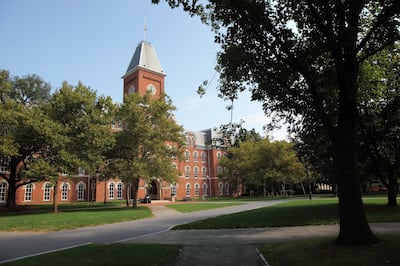
After finishing an MBA at Ohio State University, which again divided her time between working and studying, and severely curtailed sleep and opportunities to watch her favourite sitcom, Friends, she left McDonald’s for IBM.
Three years later, she moved within the technology company to the UK to set up home with her second husband, a commercial surveyor.
By 2007, Khoury-Haq was entering the world of finance with a specialist insurance and underwriting company, and it was during this time that she had a miscarriage.
“It took lots of years and lots of surgeries to get pregnant again, which I did through IVF,” she says. “When I was six months’ pregnant, I lost my eldest daughter shortly after birth.”
However, Khoury-Haq always felt that there were two souls out there who were going to be hers one way or another, and had no intention of giving up.
“I didn't know if I was going to have them myself. I didn't know if I was going to adopt them. I didn't know where they were going to come from. But the thing I really didn't know was that they were going to show up on the same day.”
A surrogate carried the couple's last two frozen embryos and twins arrived after 16 years of marriage when Khoury-Haq was chief operating officer at Lloyd’s of London.
“Having waited for my babies for so long, the last thing in the world I was going to do was ignore them. So, I had to be a full and present mother. But I loved my job and I was also good at it.”
It took time and a supportive boss to navigate the ensuing work-life imbalance but Khoury-Haq would go on to challenge the corporate conventional wisdom dictating that employees had work lives and home lives and never the twain should meet.
As she puts it, “A person is a person – you can't separate a person into two.”
“What that means is that people can have time off for fertility treatment, and that's whether they're male or whether they're female or whether they're going through the treatment with a surrogate,” she says.
“The question then is how do they do it? Do they have to use up their holiday time? Do they have to be stressed and not mention it to anyone?
“If they have a miscarriage, do they have to hide it? Or is it better to support that individual all the way through and be able to have open conversations in the workplace about these issues so that people can be their whole selves?
“If you can treat them like that, then you get more out of the individual professionally, they feel more fulfilled personally, and it's a better outcome all the way around.”
If Christmases on the domestic front have changed since the arrival of Khoury-Haq’s twins, then so have holidays.
Where once it was a couple with a free-wheeling attitude exploring countries and cities in a rental car, child-friendly holidays are now the norm.
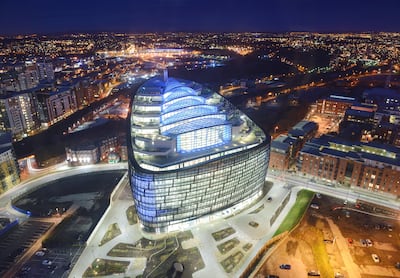
Looking out as the pouring rain falls on the brown-brick former warehouses of Manchester that back up to the Co-op's headquarters on Angel Square, she recalls a recent break with the girls to Turkey, somewhere that right now seems another world away.
It is possible, she warns, to take cultural exploits too far, though. Last time, the tour of historic buildings and palaces in Istanbul, and instruction about the family’s association with them, did not go down so well.
The girls’ verdict, perhaps not recorded on TripAdvisor, was: “Very boring.”
Khoury-Haq’s month-to-month travel takes her all over the country on a never-ending itinerary to as many of the Co-op convenience stores as possible, much as she did at McDonald’s back in the day.
Usually, she turns up unexpectedly, talking loudly about the practices that are working, more quietly about the ones less so, and attempting to stifle any compulsion to fix those in little need of fixing at all.
